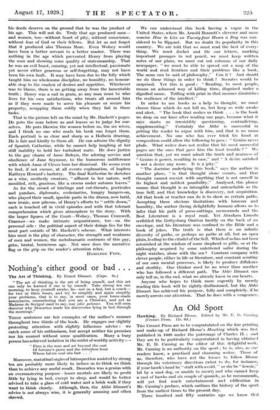Nothing's either good or bad . . .
The Art of Thinking. By Ernest Dimnet. (Cape. 6s.) " The art of thinking is the art of being oneself, and this art can only be learned if one is by oneself. Take strong tea one morning, to keep yourself awake, lie—not on a bed, but a couch— for two or three hours, and try to simplify and again simplify your problems, that is to say, in most cases, your home-made annoyances, remembering that you are a Christian, and not as Madame de Sevign6 used to say, une jolie paienne. You will soon discover why Descartes made his discoveries lying in bed through the mornings."
THESE sentences are fair examples of the author's manner throughout two thirds of the book. He engages our slightly protesting attention with slightly fallacious advice : we
catch some of his enthusiasm, but accept neither his premises nor his counsel without some qualification. Many a busy
person has achieved isolation in the midst of worldly activity:— "Firm is the man and set beyond the cast
Of fortune's game and the relentless hour Whose falcon soul sits fast . . ."
Moreover, matutinal orgies of introspection assisted by strong tea are probably more likely to induce us to think we think than to achieve any useful result. Descartes was a genius with an overmastering purpose—lesser mortals are likely to profit little by lying in bed, except to sleep, and would be better advised to take a glass of cold water and a brisk walk if they want to think dearly. Although, then, the Abbe Dimnet's advice is not always wise, it is generally amusing and often shrewd. We can understand this book having a vogue in the United States, where Mr. Arnold Bennett's cleverer and more concise How to Live on Twenty-four Hours a Day was con- sidered to be flippant. But we doubt its popularity in this country. We are told that we must read the best of every- thing. We must docket and file our letters, marking important passages in red pencil, we must keep written notes of our plans, we must cut out columns of our daily newspaper, " we must be able to spread out a map of the world and read frontiers and their problems like a book.
The same can be said of philosophy." Can it ? And should we do these things in order to think ? Socrates would be surprised. Yet this is good : " Reading, to most people, means an ashamed way of killing time, disguised under a dignified name. Trifling with print in that manner diminishes the resilience of the intellect."
In order to use books as a help to thought, we must choose those which do not lull us, but keep us wide awake and alert. The book that makes us think . . . is the book we drop on our knee after reading one page, because what it says starts us irresistibly questioning, contradicting, supplementing." Certainly the Abbe is successful in getting the reader to argue with him, and that is no mean achievement. No one who has ever tried his hand at composition could allow the following to pass : " Genius never plods. What writer does not realize that his most successful pages are the ones that gave him the least trouble ? " We question that, yet we must admit the truth and neatness of " Genius is power, resulting in ease," and " A desire satisfied is not a desire any more. It is a pity."
" The doctrine underlying this book," says the author in another place, " is that thought alone counts, and that thought cannot coexist with anything that is not ourself in its highest and noblest possibility." Analysed, this phrase means that thought is as intangible and unteachable as the true Self, and that knowledge is discovery, not acquisition. All that book or teacher can do is to show us certain paths. Accepting these obvious limitations with humour and humility, the author (being delightfully human) allows us to infer that his path of press-cuttings, memoranda and the Best Literature is a royal road. Yet Abraham Lincoln scribbled the Gettysburg Oration hastily on the back of an envelope, and his literature was confined to the Bible and a book of jokes. The truth is that there is an infinite diversity of paths, or perhaps no paths at all, but an open plain, leading to the citadel of the Self. Which of us has not been astonished at the wisdom of some shepherd or gillie, or at the philosophy acquired by some unlettered sailor during the night watches, alone with the sea ? Constant company with clever people, either in life or literature, and constant scrutiny of our own mental processes, is likely to produce diffidence and sterility. One thinker need be no wiser than another who has followed a different path. The Abbe Dimnet can only tell us, in the end, what we already know in our hearts.
Anyone who hopes to think more cogently by merely reading this book will be rightly disillusioned, but the Abbe Dimnet has achieved his purpose, fully and completely, if he merely arrests our attention. That he does with a vengeance.
































 Previous page
Previous page